An Analysis of the Mental Capacity Act (2005) and Its Implications
VerifiedAdded on 2020/07/22
|9
|3284
|64
Essay
AI Summary
This essay provides a detailed examination of the Mental Capacity Act (MCA) 2005, focusing on its principles, the rights of individuals lacking mental capacity, and the responsibilities of practitioners in implementing the Act. It explores the importance of capacity assessment, best interests decision-making, and the role of Independent Mental Capacity Advocates (IMCAs). The essay discusses the concept of deprivation of liberty and the 'Bournewood Gap,' analyzing the safeguards put in place to protect individuals. Furthermore, it evaluates the MCA in light of the House of Lords Scrutiny Document, emphasizing the need for wider understanding and implementation across various sectors, including healthcare and social care. The essay highlights the importance of training and awareness among professionals to ensure the effective application of the MCA, protecting vulnerable individuals and promoting their autonomy where possible.
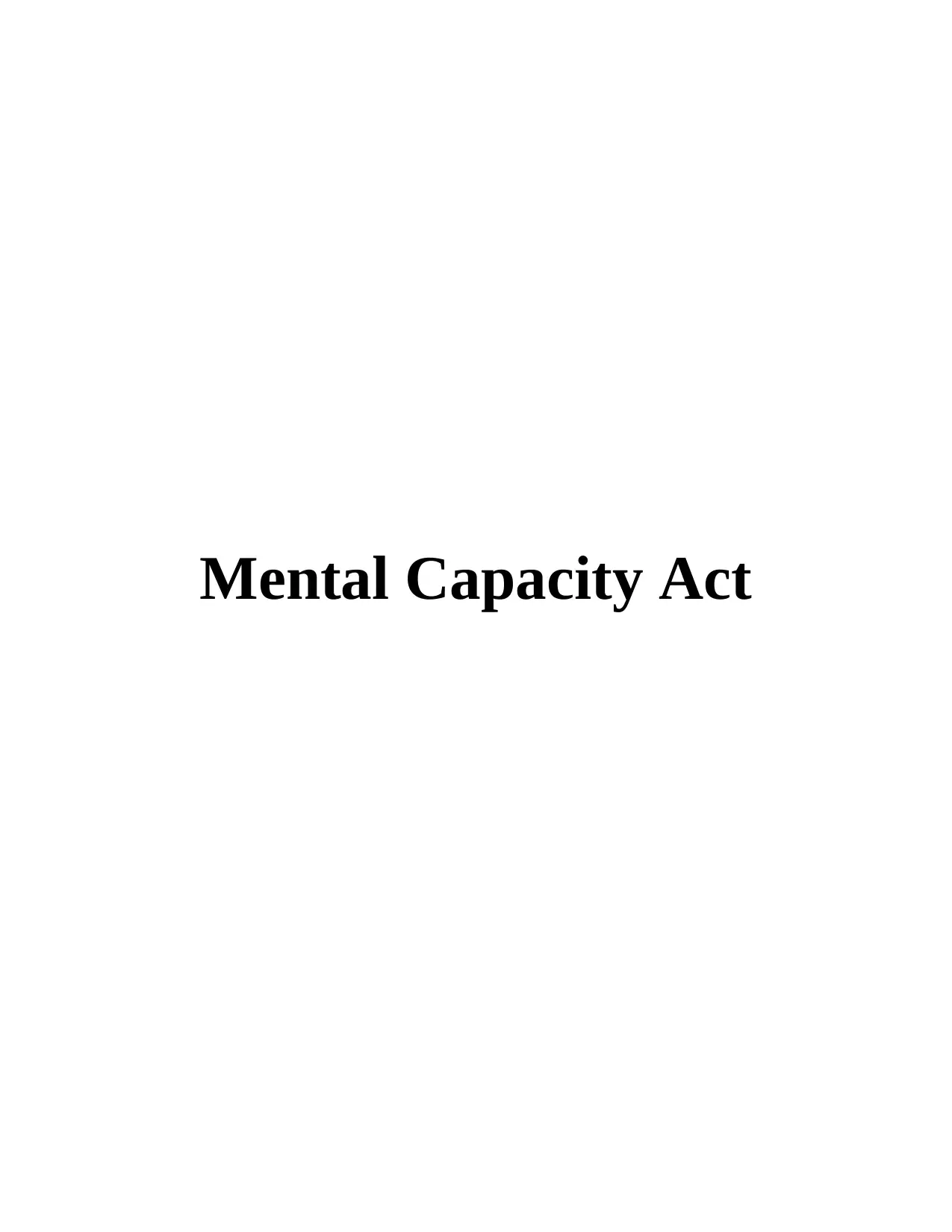
Mental Capacity Act
Paraphrase This Document
Need a fresh take? Get an instant paraphrase of this document with our AI Paraphraser
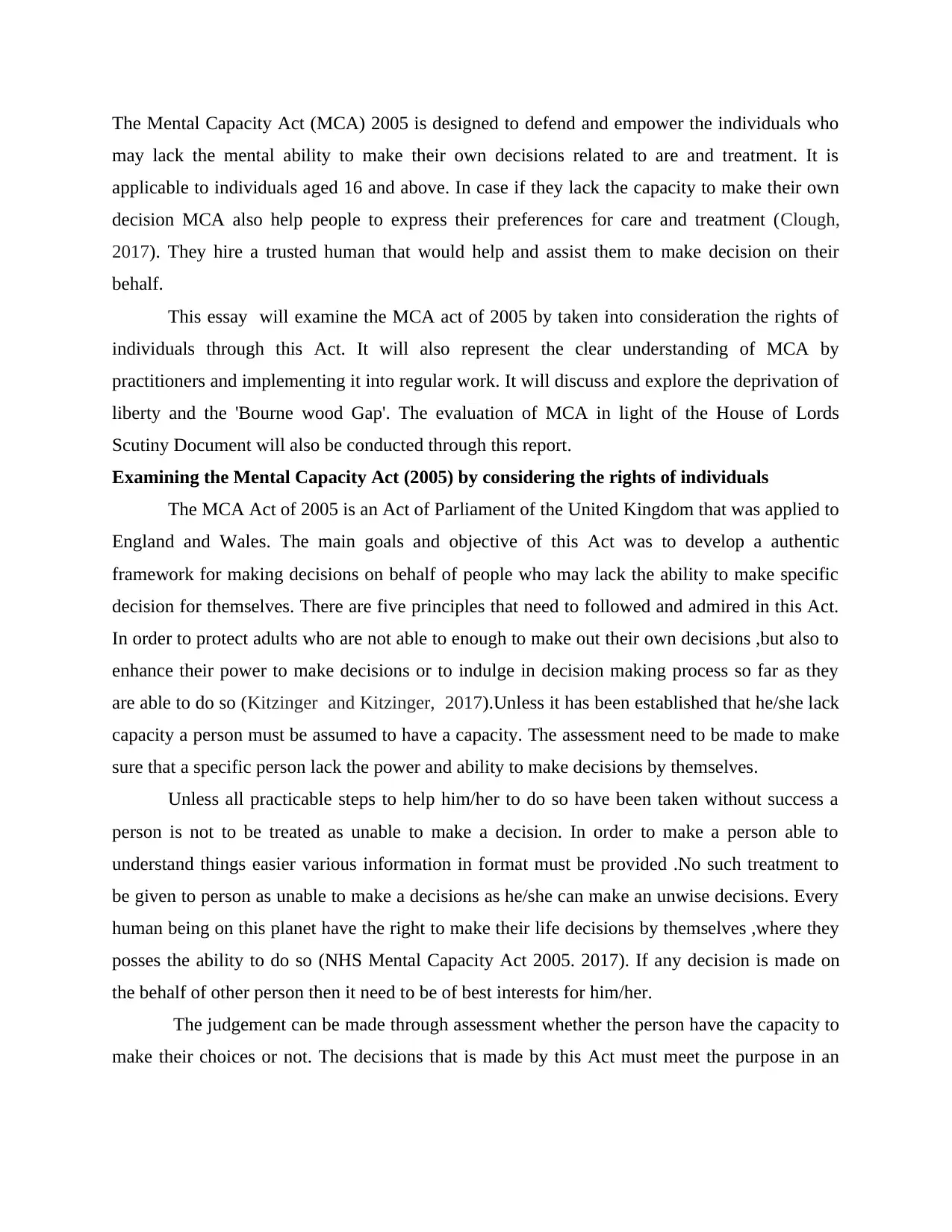
The Mental Capacity Act (MCA) 2005 is designed to defend and empower the individuals who
may lack the mental ability to make their own decisions related to are and treatment. It is
applicable to individuals aged 16 and above. In case if they lack the capacity to make their own
decision MCA also help people to express their preferences for care and treatment (Clough,
2017). They hire a trusted human that would help and assist them to make decision on their
behalf.
This essay will examine the MCA act of 2005 by taken into consideration the rights of
individuals through this Act. It will also represent the clear understanding of MCA by
practitioners and implementing it into regular work. It will discuss and explore the deprivation of
liberty and the 'Bourne wood Gap'. The evaluation of MCA in light of the House of Lords
Scutiny Document will also be conducted through this report.
Examining the Mental Capacity Act (2005) by considering the rights of individuals
The MCA Act of 2005 is an Act of Parliament of the United Kingdom that was applied to
England and Wales. The main goals and objective of this Act was to develop a authentic
framework for making decisions on behalf of people who may lack the ability to make specific
decision for themselves. There are five principles that need to followed and admired in this Act.
In order to protect adults who are not able to enough to make out their own decisions ,but also to
enhance their power to make decisions or to indulge in decision making process so far as they
are able to do so (Kitzinger and Kitzinger, 2017).Unless it has been established that he/she lack
capacity a person must be assumed to have a capacity. The assessment need to be made to make
sure that a specific person lack the power and ability to make decisions by themselves.
Unless all practicable steps to help him/her to do so have been taken without success a
person is not to be treated as unable to make a decision. In order to make a person able to
understand things easier various information in format must be provided .No such treatment to
be given to person as unable to make a decisions as he/she can make an unwise decisions. Every
human being on this planet have the right to make their life decisions by themselves ,where they
posses the ability to do so (NHS Mental Capacity Act 2005. 2017). If any decision is made on
the behalf of other person then it need to be of best interests for him/her.
The judgement can be made through assessment whether the person have the capacity to
make their choices or not. The decisions that is made by this Act must meet the purpose in an
may lack the mental ability to make their own decisions related to are and treatment. It is
applicable to individuals aged 16 and above. In case if they lack the capacity to make their own
decision MCA also help people to express their preferences for care and treatment (Clough,
2017). They hire a trusted human that would help and assist them to make decision on their
behalf.
This essay will examine the MCA act of 2005 by taken into consideration the rights of
individuals through this Act. It will also represent the clear understanding of MCA by
practitioners and implementing it into regular work. It will discuss and explore the deprivation of
liberty and the 'Bourne wood Gap'. The evaluation of MCA in light of the House of Lords
Scutiny Document will also be conducted through this report.
Examining the Mental Capacity Act (2005) by considering the rights of individuals
The MCA Act of 2005 is an Act of Parliament of the United Kingdom that was applied to
England and Wales. The main goals and objective of this Act was to develop a authentic
framework for making decisions on behalf of people who may lack the ability to make specific
decision for themselves. There are five principles that need to followed and admired in this Act.
In order to protect adults who are not able to enough to make out their own decisions ,but also to
enhance their power to make decisions or to indulge in decision making process so far as they
are able to do so (Kitzinger and Kitzinger, 2017).Unless it has been established that he/she lack
capacity a person must be assumed to have a capacity. The assessment need to be made to make
sure that a specific person lack the power and ability to make decisions by themselves.
Unless all practicable steps to help him/her to do so have been taken without success a
person is not to be treated as unable to make a decision. In order to make a person able to
understand things easier various information in format must be provided .No such treatment to
be given to person as unable to make a decisions as he/she can make an unwise decisions. Every
human being on this planet have the right to make their life decisions by themselves ,where they
posses the ability to do so (NHS Mental Capacity Act 2005. 2017). If any decision is made on
the behalf of other person then it need to be of best interests for him/her.
The judgement can be made through assessment whether the person have the capacity to
make their choices or not. The decisions that is made by this Act must meet the purpose in an
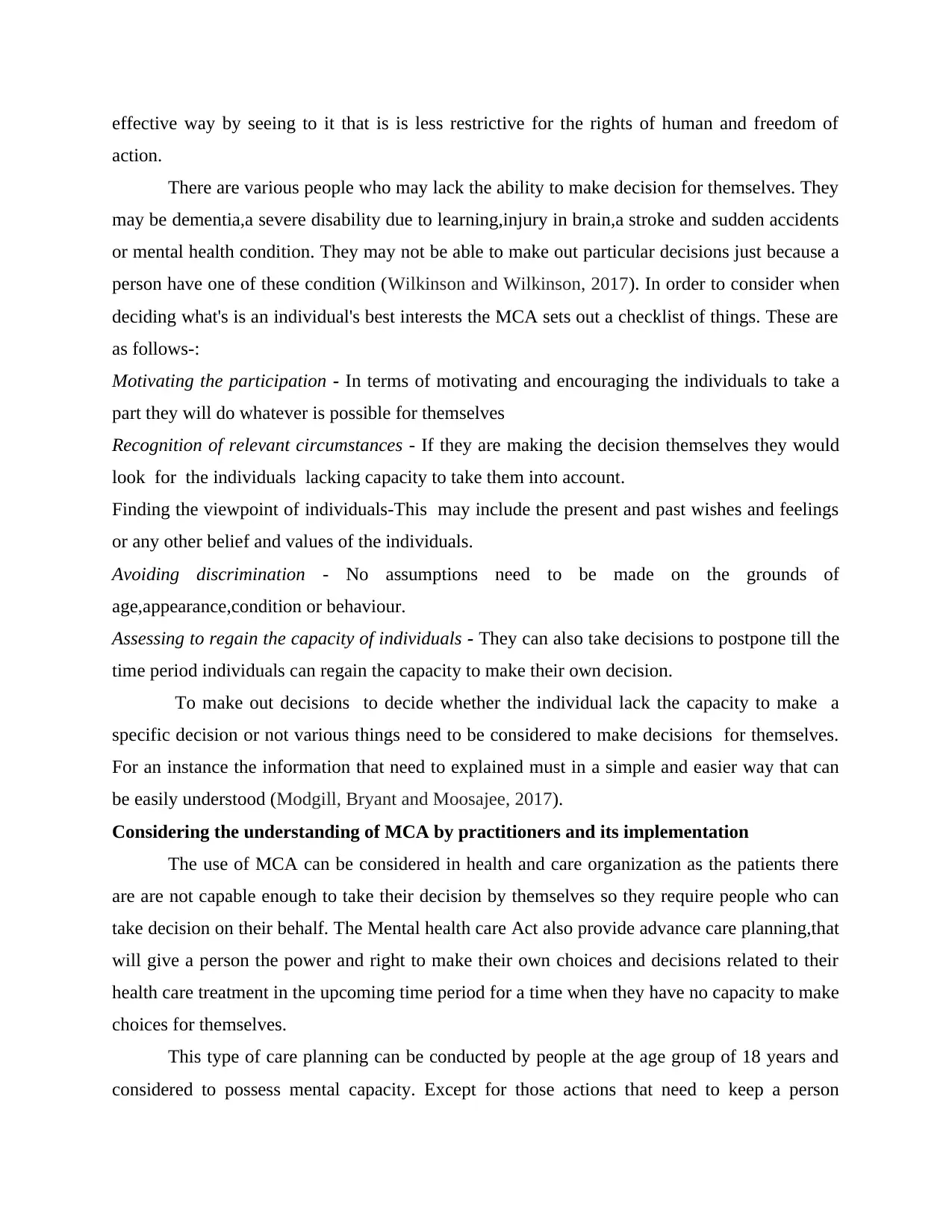
effective way by seeing to it that is is less restrictive for the rights of human and freedom of
action.
There are various people who may lack the ability to make decision for themselves. They
may be dementia,a severe disability due to learning,injury in brain,a stroke and sudden accidents
or mental health condition. They may not be able to make out particular decisions just because a
person have one of these condition (Wilkinson and Wilkinson, 2017). In order to consider when
deciding what's is an individual's best interests the MCA sets out a checklist of things. These are
as follows-:
Motivating the participation - In terms of motivating and encouraging the individuals to take a
part they will do whatever is possible for themselves
Recognition of relevant circumstances - If they are making the decision themselves they would
look for the individuals lacking capacity to take them into account.
Finding the viewpoint of individuals-This may include the present and past wishes and feelings
or any other belief and values of the individuals.
Avoiding discrimination - No assumptions need to be made on the grounds of
age,appearance,condition or behaviour.
Assessing to regain the capacity of individuals - They can also take decisions to postpone till the
time period individuals can regain the capacity to make their own decision.
To make out decisions to decide whether the individual lack the capacity to make a
specific decision or not various things need to be considered to make decisions for themselves.
For an instance the information that need to explained must in a simple and easier way that can
be easily understood (Modgill, Bryant and Moosajee, 2017).
Considering the understanding of MCA by practitioners and its implementation
The use of MCA can be considered in health and care organization as the patients there
are are not capable enough to take their decision by themselves so they require people who can
take decision on their behalf. The Mental health care Act also provide advance care planning,that
will give a person the power and right to make their own choices and decisions related to their
health care treatment in the upcoming time period for a time when they have no capacity to make
choices for themselves.
This type of care planning can be conducted by people at the age group of 18 years and
considered to possess mental capacity. Except for those actions that need to keep a person
action.
There are various people who may lack the ability to make decision for themselves. They
may be dementia,a severe disability due to learning,injury in brain,a stroke and sudden accidents
or mental health condition. They may not be able to make out particular decisions just because a
person have one of these condition (Wilkinson and Wilkinson, 2017). In order to consider when
deciding what's is an individual's best interests the MCA sets out a checklist of things. These are
as follows-:
Motivating the participation - In terms of motivating and encouraging the individuals to take a
part they will do whatever is possible for themselves
Recognition of relevant circumstances - If they are making the decision themselves they would
look for the individuals lacking capacity to take them into account.
Finding the viewpoint of individuals-This may include the present and past wishes and feelings
or any other belief and values of the individuals.
Avoiding discrimination - No assumptions need to be made on the grounds of
age,appearance,condition or behaviour.
Assessing to regain the capacity of individuals - They can also take decisions to postpone till the
time period individuals can regain the capacity to make their own decision.
To make out decisions to decide whether the individual lack the capacity to make a
specific decision or not various things need to be considered to make decisions for themselves.
For an instance the information that need to explained must in a simple and easier way that can
be easily understood (Modgill, Bryant and Moosajee, 2017).
Considering the understanding of MCA by practitioners and its implementation
The use of MCA can be considered in health and care organization as the patients there
are are not capable enough to take their decision by themselves so they require people who can
take decision on their behalf. The Mental health care Act also provide advance care planning,that
will give a person the power and right to make their own choices and decisions related to their
health care treatment in the upcoming time period for a time when they have no capacity to make
choices for themselves.
This type of care planning can be conducted by people at the age group of 18 years and
considered to possess mental capacity. Except for those actions that need to keep a person
⊘ This is a preview!⊘
Do you want full access?
Subscribe today to unlock all pages.

Trusted by 1+ million students worldwide
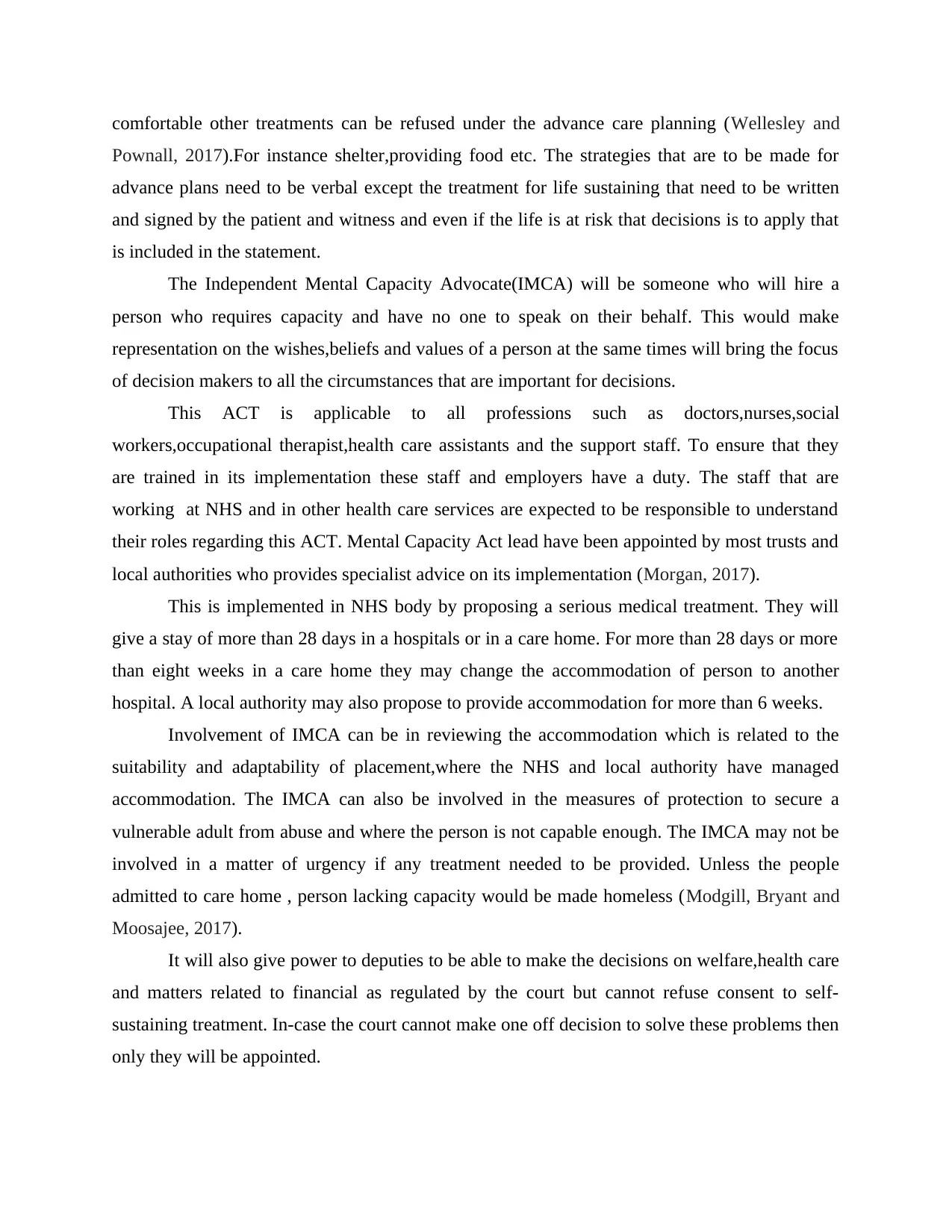
comfortable other treatments can be refused under the advance care planning (Wellesley and
Pownall, 2017).For instance shelter,providing food etc. The strategies that are to be made for
advance plans need to be verbal except the treatment for life sustaining that need to be written
and signed by the patient and witness and even if the life is at risk that decisions is to apply that
is included in the statement.
The Independent Mental Capacity Advocate(IMCA) will be someone who will hire a
person who requires capacity and have no one to speak on their behalf. This would make
representation on the wishes,beliefs and values of a person at the same times will bring the focus
of decision makers to all the circumstances that are important for decisions.
This ACT is applicable to all professions such as doctors,nurses,social
workers,occupational therapist,health care assistants and the support staff. To ensure that they
are trained in its implementation these staff and employers have a duty. The staff that are
working at NHS and in other health care services are expected to be responsible to understand
their roles regarding this ACT. Mental Capacity Act lead have been appointed by most trusts and
local authorities who provides specialist advice on its implementation (Morgan, 2017).
This is implemented in NHS body by proposing a serious medical treatment. They will
give a stay of more than 28 days in a hospitals or in a care home. For more than 28 days or more
than eight weeks in a care home they may change the accommodation of person to another
hospital. A local authority may also propose to provide accommodation for more than 6 weeks.
Involvement of IMCA can be in reviewing the accommodation which is related to the
suitability and adaptability of placement,where the NHS and local authority have managed
accommodation. The IMCA can also be involved in the measures of protection to secure a
vulnerable adult from abuse and where the person is not capable enough. The IMCA may not be
involved in a matter of urgency if any treatment needed to be provided. Unless the people
admitted to care home , person lacking capacity would be made homeless (Modgill, Bryant and
Moosajee, 2017).
It will also give power to deputies to be able to make the decisions on welfare,health care
and matters related to financial as regulated by the court but cannot refuse consent to self-
sustaining treatment. In-case the court cannot make one off decision to solve these problems then
only they will be appointed.
Pownall, 2017).For instance shelter,providing food etc. The strategies that are to be made for
advance plans need to be verbal except the treatment for life sustaining that need to be written
and signed by the patient and witness and even if the life is at risk that decisions is to apply that
is included in the statement.
The Independent Mental Capacity Advocate(IMCA) will be someone who will hire a
person who requires capacity and have no one to speak on their behalf. This would make
representation on the wishes,beliefs and values of a person at the same times will bring the focus
of decision makers to all the circumstances that are important for decisions.
This ACT is applicable to all professions such as doctors,nurses,social
workers,occupational therapist,health care assistants and the support staff. To ensure that they
are trained in its implementation these staff and employers have a duty. The staff that are
working at NHS and in other health care services are expected to be responsible to understand
their roles regarding this ACT. Mental Capacity Act lead have been appointed by most trusts and
local authorities who provides specialist advice on its implementation (Morgan, 2017).
This is implemented in NHS body by proposing a serious medical treatment. They will
give a stay of more than 28 days in a hospitals or in a care home. For more than 28 days or more
than eight weeks in a care home they may change the accommodation of person to another
hospital. A local authority may also propose to provide accommodation for more than 6 weeks.
Involvement of IMCA can be in reviewing the accommodation which is related to the
suitability and adaptability of placement,where the NHS and local authority have managed
accommodation. The IMCA can also be involved in the measures of protection to secure a
vulnerable adult from abuse and where the person is not capable enough. The IMCA may not be
involved in a matter of urgency if any treatment needed to be provided. Unless the people
admitted to care home , person lacking capacity would be made homeless (Modgill, Bryant and
Moosajee, 2017).
It will also give power to deputies to be able to make the decisions on welfare,health care
and matters related to financial as regulated by the court but cannot refuse consent to self-
sustaining treatment. In-case the court cannot make one off decision to solve these problems then
only they will be appointed.
Paraphrase This Document
Need a fresh take? Get an instant paraphrase of this document with our AI Paraphraser
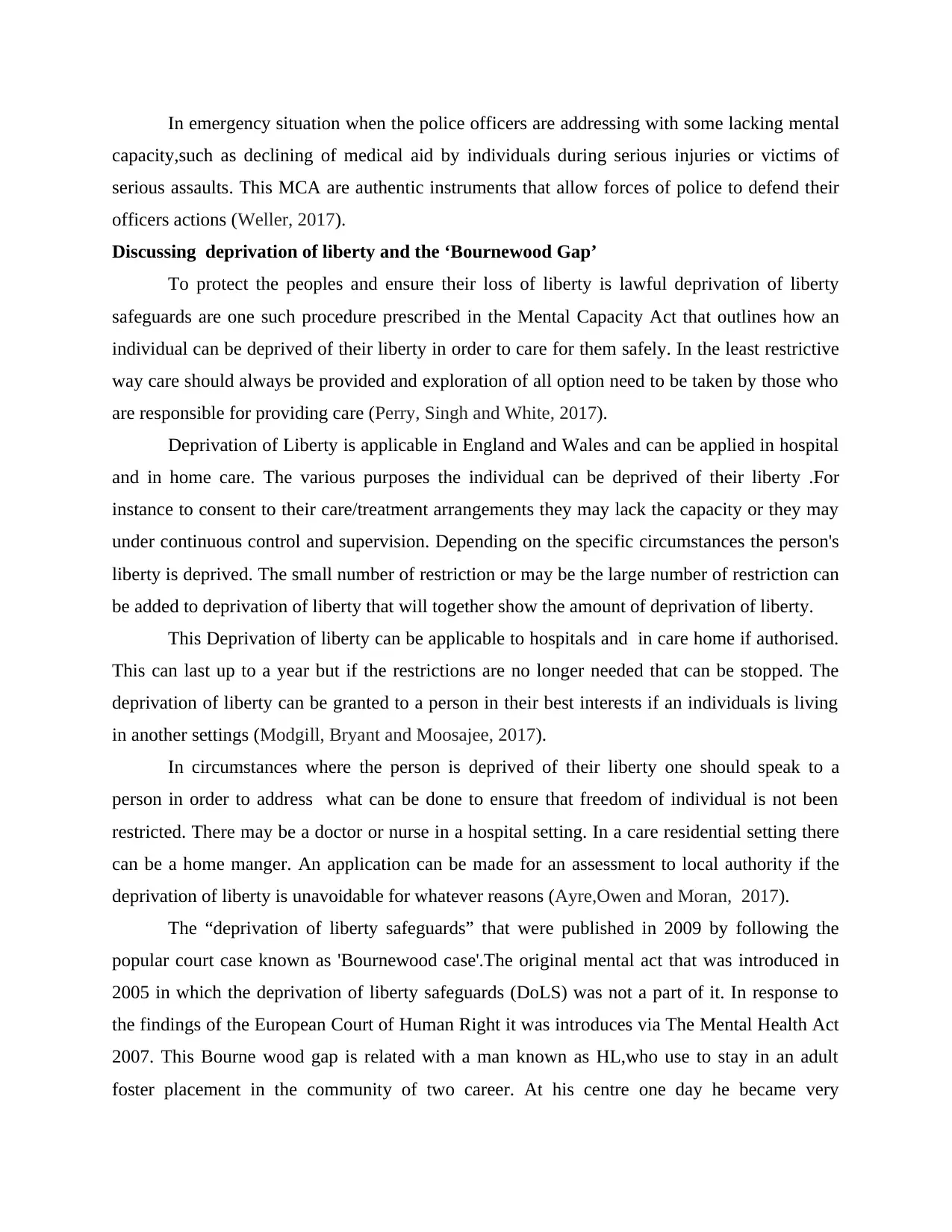
In emergency situation when the police officers are addressing with some lacking mental
capacity,such as declining of medical aid by individuals during serious injuries or victims of
serious assaults. This MCA are authentic instruments that allow forces of police to defend their
officers actions (Weller, 2017).
Discussing deprivation of liberty and the ‘Bournewood Gap’
To protect the peoples and ensure their loss of liberty is lawful deprivation of liberty
safeguards are one such procedure prescribed in the Mental Capacity Act that outlines how an
individual can be deprived of their liberty in order to care for them safely. In the least restrictive
way care should always be provided and exploration of all option need to be taken by those who
are responsible for providing care (Perry, Singh and White, 2017).
Deprivation of Liberty is applicable in England and Wales and can be applied in hospital
and in home care. The various purposes the individual can be deprived of their liberty .For
instance to consent to their care/treatment arrangements they may lack the capacity or they may
under continuous control and supervision. Depending on the specific circumstances the person's
liberty is deprived. The small number of restriction or may be the large number of restriction can
be added to deprivation of liberty that will together show the amount of deprivation of liberty.
This Deprivation of liberty can be applicable to hospitals and in care home if authorised.
This can last up to a year but if the restrictions are no longer needed that can be stopped. The
deprivation of liberty can be granted to a person in their best interests if an individuals is living
in another settings (Modgill, Bryant and Moosajee, 2017).
In circumstances where the person is deprived of their liberty one should speak to a
person in order to address what can be done to ensure that freedom of individual is not been
restricted. There may be a doctor or nurse in a hospital setting. In a care residential setting there
can be a home manger. An application can be made for an assessment to local authority if the
deprivation of liberty is unavoidable for whatever reasons (Ayre,Owen and Moran, 2017).
The “deprivation of liberty safeguards” that were published in 2009 by following the
popular court case known as 'Bournewood case'.The original mental act that was introduced in
2005 in which the deprivation of liberty safeguards (DoLS) was not a part of it. In response to
the findings of the European Court of Human Right it was introduces via The Mental Health Act
2007. This Bourne wood gap is related with a man known as HL,who use to stay in an adult
foster placement in the community of two career. At his centre one day he became very
capacity,such as declining of medical aid by individuals during serious injuries or victims of
serious assaults. This MCA are authentic instruments that allow forces of police to defend their
officers actions (Weller, 2017).
Discussing deprivation of liberty and the ‘Bournewood Gap’
To protect the peoples and ensure their loss of liberty is lawful deprivation of liberty
safeguards are one such procedure prescribed in the Mental Capacity Act that outlines how an
individual can be deprived of their liberty in order to care for them safely. In the least restrictive
way care should always be provided and exploration of all option need to be taken by those who
are responsible for providing care (Perry, Singh and White, 2017).
Deprivation of Liberty is applicable in England and Wales and can be applied in hospital
and in home care. The various purposes the individual can be deprived of their liberty .For
instance to consent to their care/treatment arrangements they may lack the capacity or they may
under continuous control and supervision. Depending on the specific circumstances the person's
liberty is deprived. The small number of restriction or may be the large number of restriction can
be added to deprivation of liberty that will together show the amount of deprivation of liberty.
This Deprivation of liberty can be applicable to hospitals and in care home if authorised.
This can last up to a year but if the restrictions are no longer needed that can be stopped. The
deprivation of liberty can be granted to a person in their best interests if an individuals is living
in another settings (Modgill, Bryant and Moosajee, 2017).
In circumstances where the person is deprived of their liberty one should speak to a
person in order to address what can be done to ensure that freedom of individual is not been
restricted. There may be a doctor or nurse in a hospital setting. In a care residential setting there
can be a home manger. An application can be made for an assessment to local authority if the
deprivation of liberty is unavoidable for whatever reasons (Ayre,Owen and Moran, 2017).
The “deprivation of liberty safeguards” that were published in 2009 by following the
popular court case known as 'Bournewood case'.The original mental act that was introduced in
2005 in which the deprivation of liberty safeguards (DoLS) was not a part of it. In response to
the findings of the European Court of Human Right it was introduces via The Mental Health Act
2007. This Bourne wood gap is related with a man known as HL,who use to stay in an adult
foster placement in the community of two career. At his centre one day he became very
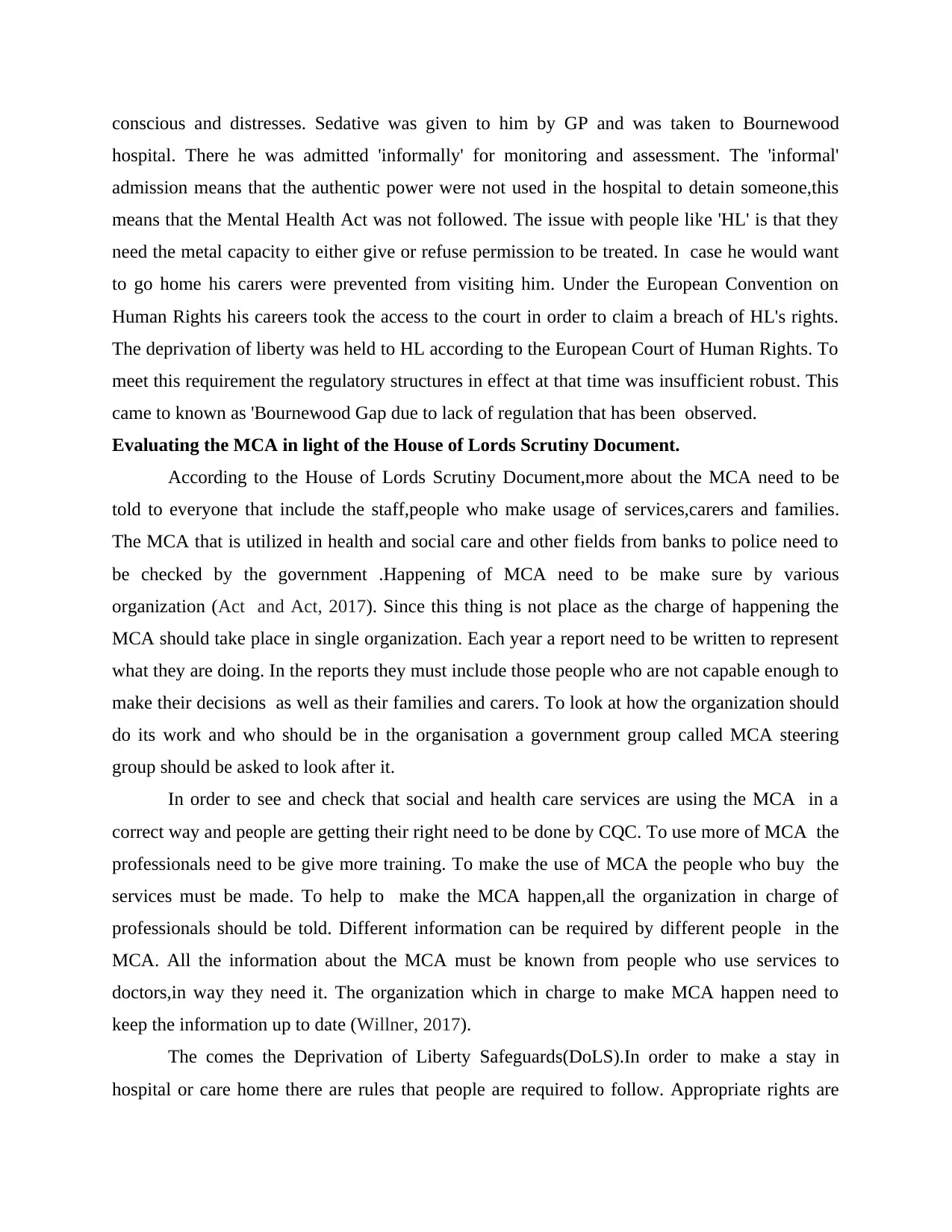
conscious and distresses. Sedative was given to him by GP and was taken to Bournewood
hospital. There he was admitted 'informally' for monitoring and assessment. The 'informal'
admission means that the authentic power were not used in the hospital to detain someone,this
means that the Mental Health Act was not followed. The issue with people like 'HL' is that they
need the metal capacity to either give or refuse permission to be treated. In case he would want
to go home his carers were prevented from visiting him. Under the European Convention on
Human Rights his careers took the access to the court in order to claim a breach of HL's rights.
The deprivation of liberty was held to HL according to the European Court of Human Rights. To
meet this requirement the regulatory structures in effect at that time was insufficient robust. This
came to known as 'Bournewood Gap due to lack of regulation that has been observed.
Evaluating the MCA in light of the House of Lords Scrutiny Document.
According to the House of Lords Scrutiny Document,more about the MCA need to be
told to everyone that include the staff,people who make usage of services,carers and families.
The MCA that is utilized in health and social care and other fields from banks to police need to
be checked by the government .Happening of MCA need to be make sure by various
organization (Act and Act, 2017). Since this thing is not place as the charge of happening the
MCA should take place in single organization. Each year a report need to be written to represent
what they are doing. In the reports they must include those people who are not capable enough to
make their decisions as well as their families and carers. To look at how the organization should
do its work and who should be in the organisation a government group called MCA steering
group should be asked to look after it.
In order to see and check that social and health care services are using the MCA in a
correct way and people are getting their right need to be done by CQC. To use more of MCA the
professionals need to be give more training. To make the use of MCA the people who buy the
services must be made. To help to make the MCA happen,all the organization in charge of
professionals should be told. Different information can be required by different people in the
MCA. All the information about the MCA must be known from people who use services to
doctors,in way they need it. The organization which in charge to make MCA happen need to
keep the information up to date (Willner, 2017).
The comes the Deprivation of Liberty Safeguards(DoLS).In order to make a stay in
hospital or care home there are rules that people are required to follow. Appropriate rights are
hospital. There he was admitted 'informally' for monitoring and assessment. The 'informal'
admission means that the authentic power were not used in the hospital to detain someone,this
means that the Mental Health Act was not followed. The issue with people like 'HL' is that they
need the metal capacity to either give or refuse permission to be treated. In case he would want
to go home his carers were prevented from visiting him. Under the European Convention on
Human Rights his careers took the access to the court in order to claim a breach of HL's rights.
The deprivation of liberty was held to HL according to the European Court of Human Rights. To
meet this requirement the regulatory structures in effect at that time was insufficient robust. This
came to known as 'Bournewood Gap due to lack of regulation that has been observed.
Evaluating the MCA in light of the House of Lords Scrutiny Document.
According to the House of Lords Scrutiny Document,more about the MCA need to be
told to everyone that include the staff,people who make usage of services,carers and families.
The MCA that is utilized in health and social care and other fields from banks to police need to
be checked by the government .Happening of MCA need to be make sure by various
organization (Act and Act, 2017). Since this thing is not place as the charge of happening the
MCA should take place in single organization. Each year a report need to be written to represent
what they are doing. In the reports they must include those people who are not capable enough to
make their decisions as well as their families and carers. To look at how the organization should
do its work and who should be in the organisation a government group called MCA steering
group should be asked to look after it.
In order to see and check that social and health care services are using the MCA in a
correct way and people are getting their right need to be done by CQC. To use more of MCA the
professionals need to be give more training. To make the use of MCA the people who buy the
services must be made. To help to make the MCA happen,all the organization in charge of
professionals should be told. Different information can be required by different people in the
MCA. All the information about the MCA must be known from people who use services to
doctors,in way they need it. The organization which in charge to make MCA happen need to
keep the information up to date (Willner, 2017).
The comes the Deprivation of Liberty Safeguards(DoLS).In order to make a stay in
hospital or care home there are rules that people are required to follow. Appropriate rights are
⊘ This is a preview!⊘
Do you want full access?
Subscribe today to unlock all pages.

Trusted by 1+ million students worldwide
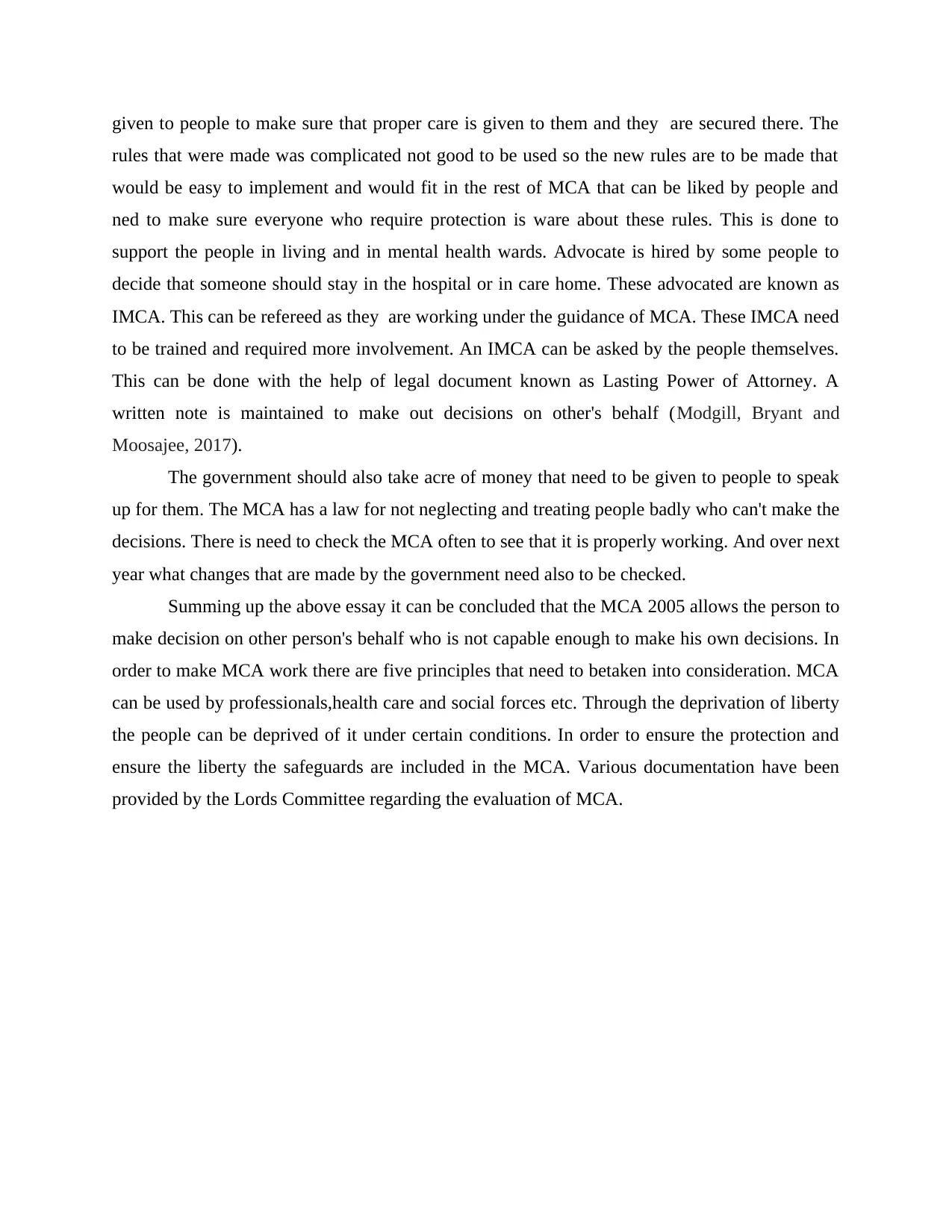
given to people to make sure that proper care is given to them and they are secured there. The
rules that were made was complicated not good to be used so the new rules are to be made that
would be easy to implement and would fit in the rest of MCA that can be liked by people and
ned to make sure everyone who require protection is ware about these rules. This is done to
support the people in living and in mental health wards. Advocate is hired by some people to
decide that someone should stay in the hospital or in care home. These advocated are known as
IMCA. This can be refereed as they are working under the guidance of MCA. These IMCA need
to be trained and required more involvement. An IMCA can be asked by the people themselves.
This can be done with the help of legal document known as Lasting Power of Attorney. A
written note is maintained to make out decisions on other's behalf (Modgill, Bryant and
Moosajee, 2017).
The government should also take acre of money that need to be given to people to speak
up for them. The MCA has a law for not neglecting and treating people badly who can't make the
decisions. There is need to check the MCA often to see that it is properly working. And over next
year what changes that are made by the government need also to be checked.
Summing up the above essay it can be concluded that the MCA 2005 allows the person to
make decision on other person's behalf who is not capable enough to make his own decisions. In
order to make MCA work there are five principles that need to betaken into consideration. MCA
can be used by professionals,health care and social forces etc. Through the deprivation of liberty
the people can be deprived of it under certain conditions. In order to ensure the protection and
ensure the liberty the safeguards are included in the MCA. Various documentation have been
provided by the Lords Committee regarding the evaluation of MCA.
rules that were made was complicated not good to be used so the new rules are to be made that
would be easy to implement and would fit in the rest of MCA that can be liked by people and
ned to make sure everyone who require protection is ware about these rules. This is done to
support the people in living and in mental health wards. Advocate is hired by some people to
decide that someone should stay in the hospital or in care home. These advocated are known as
IMCA. This can be refereed as they are working under the guidance of MCA. These IMCA need
to be trained and required more involvement. An IMCA can be asked by the people themselves.
This can be done with the help of legal document known as Lasting Power of Attorney. A
written note is maintained to make out decisions on other's behalf (Modgill, Bryant and
Moosajee, 2017).
The government should also take acre of money that need to be given to people to speak
up for them. The MCA has a law for not neglecting and treating people badly who can't make the
decisions. There is need to check the MCA often to see that it is properly working. And over next
year what changes that are made by the government need also to be checked.
Summing up the above essay it can be concluded that the MCA 2005 allows the person to
make decision on other person's behalf who is not capable enough to make his own decisions. In
order to make MCA work there are five principles that need to betaken into consideration. MCA
can be used by professionals,health care and social forces etc. Through the deprivation of liberty
the people can be deprived of it under certain conditions. In order to ensure the protection and
ensure the liberty the safeguards are included in the MCA. Various documentation have been
provided by the Lords Committee regarding the evaluation of MCA.
Paraphrase This Document
Need a fresh take? Get an instant paraphrase of this document with our AI Paraphraser
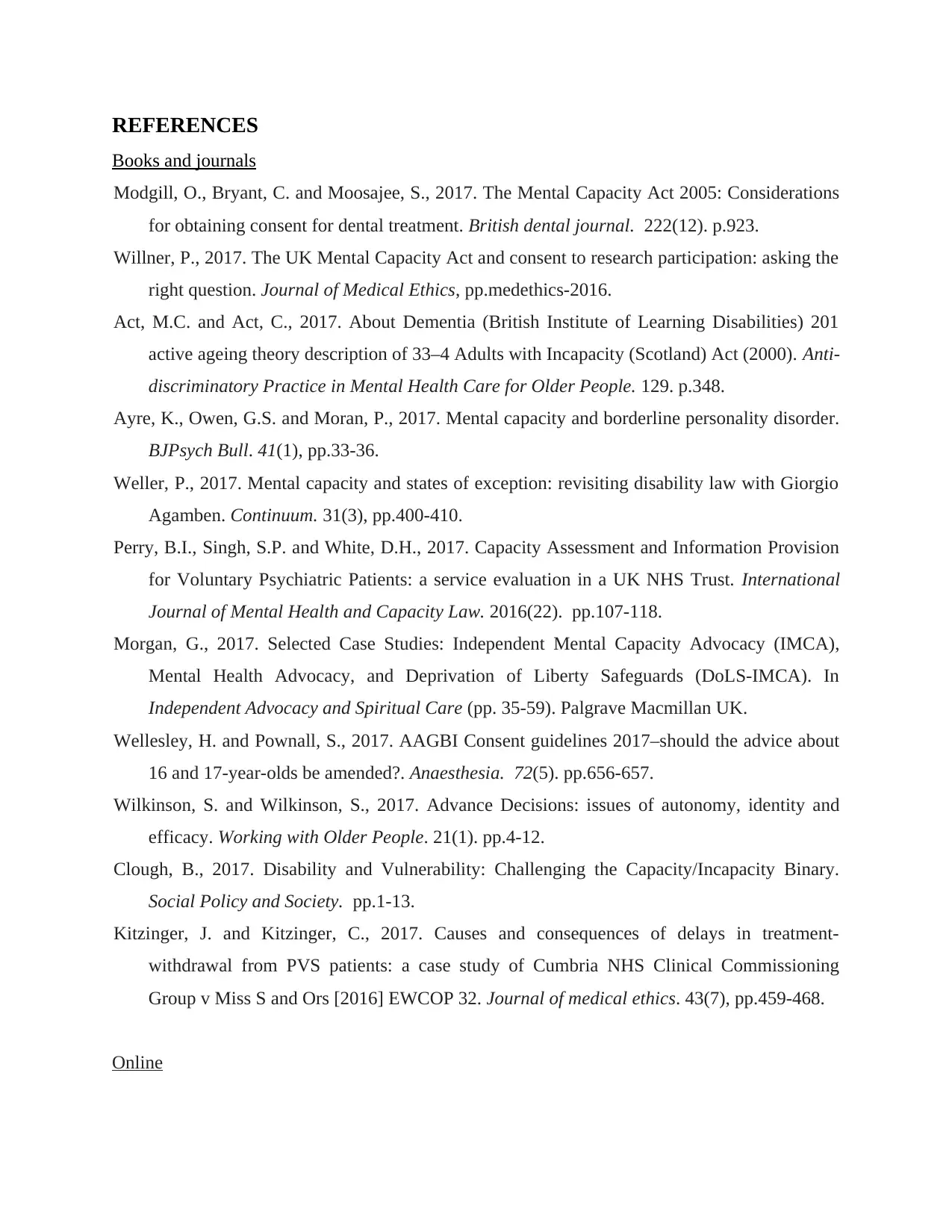
REFERENCES
Books and journals
Modgill, O., Bryant, C. and Moosajee, S., 2017. The Mental Capacity Act 2005: Considerations
for obtaining consent for dental treatment. British dental journal. 222(12). p.923.
Willner, P., 2017. The UK Mental Capacity Act and consent to research participation: asking the
right question. Journal of Medical Ethics, pp.medethics-2016.
Act, M.C. and Act, C., 2017. About Dementia (British Institute of Learning Disabilities) 201
active ageing theory description of 33–4 Adults with Incapacity (Scotland) Act (2000). Anti-
discriminatory Practice in Mental Health Care for Older People. 129. p.348.
Ayre, K., Owen, G.S. and Moran, P., 2017. Mental capacity and borderline personality disorder.
BJPsych Bull. 41(1), pp.33-36.
Weller, P., 2017. Mental capacity and states of exception: revisiting disability law with Giorgio
Agamben. Continuum. 31(3), pp.400-410.
Perry, B.I., Singh, S.P. and White, D.H., 2017. Capacity Assessment and Information Provision
for Voluntary Psychiatric Patients: a service evaluation in a UK NHS Trust. International
Journal of Mental Health and Capacity Law. 2016(22). pp.107-118.
Morgan, G., 2017. Selected Case Studies: Independent Mental Capacity Advocacy (IMCA),
Mental Health Advocacy, and Deprivation of Liberty Safeguards (DoLS-IMCA). In
Independent Advocacy and Spiritual Care (pp. 35-59). Palgrave Macmillan UK.
Wellesley, H. and Pownall, S., 2017. AAGBI Consent guidelines 2017–should the advice about
16 and 17‐year‐olds be amended?. Anaesthesia. 72(5). pp.656-657.
Wilkinson, S. and Wilkinson, S., 2017. Advance Decisions: issues of autonomy, identity and
efficacy. Working with Older People. 21(1). pp.4-12.
Clough, B., 2017. Disability and Vulnerability: Challenging the Capacity/Incapacity Binary.
Social Policy and Society. pp.1-13.
Kitzinger, J. and Kitzinger, C., 2017. Causes and consequences of delays in treatment-
withdrawal from PVS patients: a case study of Cumbria NHS Clinical Commissioning
Group v Miss S and Ors [2016] EWCOP 32. Journal of medical ethics. 43(7), pp.459-468.
Online
Books and journals
Modgill, O., Bryant, C. and Moosajee, S., 2017. The Mental Capacity Act 2005: Considerations
for obtaining consent for dental treatment. British dental journal. 222(12). p.923.
Willner, P., 2017. The UK Mental Capacity Act and consent to research participation: asking the
right question. Journal of Medical Ethics, pp.medethics-2016.
Act, M.C. and Act, C., 2017. About Dementia (British Institute of Learning Disabilities) 201
active ageing theory description of 33–4 Adults with Incapacity (Scotland) Act (2000). Anti-
discriminatory Practice in Mental Health Care for Older People. 129. p.348.
Ayre, K., Owen, G.S. and Moran, P., 2017. Mental capacity and borderline personality disorder.
BJPsych Bull. 41(1), pp.33-36.
Weller, P., 2017. Mental capacity and states of exception: revisiting disability law with Giorgio
Agamben. Continuum. 31(3), pp.400-410.
Perry, B.I., Singh, S.P. and White, D.H., 2017. Capacity Assessment and Information Provision
for Voluntary Psychiatric Patients: a service evaluation in a UK NHS Trust. International
Journal of Mental Health and Capacity Law. 2016(22). pp.107-118.
Morgan, G., 2017. Selected Case Studies: Independent Mental Capacity Advocacy (IMCA),
Mental Health Advocacy, and Deprivation of Liberty Safeguards (DoLS-IMCA). In
Independent Advocacy and Spiritual Care (pp. 35-59). Palgrave Macmillan UK.
Wellesley, H. and Pownall, S., 2017. AAGBI Consent guidelines 2017–should the advice about
16 and 17‐year‐olds be amended?. Anaesthesia. 72(5). pp.656-657.
Wilkinson, S. and Wilkinson, S., 2017. Advance Decisions: issues of autonomy, identity and
efficacy. Working with Older People. 21(1). pp.4-12.
Clough, B., 2017. Disability and Vulnerability: Challenging the Capacity/Incapacity Binary.
Social Policy and Society. pp.1-13.
Kitzinger, J. and Kitzinger, C., 2017. Causes and consequences of delays in treatment-
withdrawal from PVS patients: a case study of Cumbria NHS Clinical Commissioning
Group v Miss S and Ors [2016] EWCOP 32. Journal of medical ethics. 43(7), pp.459-468.
Online

NHS Mental Capacity ACT 2005. 2017. [Online] Available through:
<http://www.nhs.uk/Conditions/social-care-and-support-guide/Pages/mental-
capacity.aspx/>. [Accessed on 23 August 2017].
<http://www.nhs.uk/Conditions/social-care-and-support-guide/Pages/mental-
capacity.aspx/>. [Accessed on 23 August 2017].
⊘ This is a preview!⊘
Do you want full access?
Subscribe today to unlock all pages.

Trusted by 1+ million students worldwide
1 out of 9
Related Documents
Your All-in-One AI-Powered Toolkit for Academic Success.
+13062052269
info@desklib.com
Available 24*7 on WhatsApp / Email
![[object Object]](/_next/static/media/star-bottom.7253800d.svg)
Unlock your academic potential
Copyright © 2020–2026 A2Z Services. All Rights Reserved. Developed and managed by ZUCOL.





